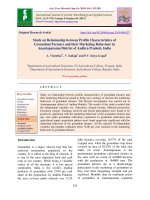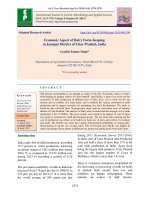Constraints faced by dairy farmers while adopting animal management practices in Dhar district of Madhya pradesh, India
Bạn đang xem bản rút gọn của tài liệu. Xem và tải ngay bản đầy đủ của tài liệu tại đây (105.24 KB, 4 trang )
Int.J.Curr.Microbiol.App.Sci (2018) 7(1): 3163-3166
International Journal of Current Microbiology and Applied Sciences
ISSN: 2319-7706 Volume 7 Number 01 (2018)
Journal homepage:
Original Research Article
/>
Constraints Faced by Dairy Farmers while Adopting Animal Management
Practices in Dhar District of Madhya Pradesh, India
J.S. Rajpoot, K.S. Kirad*, A.K. Badaya and S.S. Chauhan
RVSKVV, Krishi Vigyan Kendra, Dhar-454001, (MP), India
*Corresponding author
ABSTRACT
Keywords
Constraints, Dairy
enterprises, Project
proposal, Scientific dairy
managements,
Deworming, Deticking,
and vaccination
Article Info
Accepted:
26 December 2017
Available Online:
10 January 2018
The present study was conducted to analyse the constraints faced by the dairy farmers
in Dhar district of Madhya Pradesh. This study was conducted in four villages of three
blocks of Dhar district by personally interviewing 80 dairy farmers. Here as regards
the dairy enterprises majority of respondents states their constraints as Low price of
Milk and Milk products (83%), Lack of Technical Knowledge to manage the dairy
(78%), Lack of Storage Facility of Milk (75%), High cost of construction (74%), and
Lack of Knowledge to prepare project proposal (67.5%). As regards scientific dairy
managements their major constraints are they have not superior breed of animal,
Vaccination against contagious diseases, deworming and deticking, Maintenance of
dairy management records, follow full hand method of milking, selling of value added
dairy products. 68% respondent stated inadequate lack of loan facility where as
90%farmers do no adopt cattle insurance policy.
constraints exist simultaneously in several
stages of production under field condition.
Introduction
India has highest cattle and buffalo population
there for it also have highest milk producer
(105.42 millian tons) in the world but per
animal milk productivity is very less in the
country (19th livestock Census 15 Oct. 2012).
The average productivity of Indian cow is
only 987kg per lactation as against the world
average of 2038 kg per lactation. It is due to
farmer does not adopt improved dairy
management practices at the desired level.
Keeping the above problem in view we need
to increase the per animal milk production
rather than increase in population. Many
Constraints imply the problems or difficulties
faced by dairy farmers while adopting day-today animal husbandry practices in their dairy
enterprises. If these constraints are identified,
they are helpful to bridge the gap between
dairy technology and its adoption by dairy
farmers (Rathod et al., 2014). Present study
was under taken with the objective to identify
the major Constraints faced by milk producer
to adopt dairy enterprises and for
improvement of scientific dairy management
practices
3163
Int.J.Curr.Microbiol.App.Sci (2018) 7(1): 3163-3166
Materials and Methods
The present study was conducted Tirla,
Nalchha and Dhar blocks, district Dhar of
Madhya Pradesh. 80 farmers were selected
randomly from four Villages, (Dilabra,
Raipuria, Lunheraand, Labrabda), 20 dairy
farmers from each village are respondent. The
interview was conducted personally and Data
were collected by using pre prepared queries
related to constraint of dairy farmers like
Dairy enterprises and scientific management
of their management. All together 35
constraints were identified and responses were
scored as yes=1 and no=0.
Results and Discussion
Constrains are the problems that come in the
way of adoption of technology. Here
constraints are studied under three categories
i.e. dairy enterprises, scientific management of
dairy animals and other marketing related
constraints.
Constraints related to dairy enterprises
Here Total 9 constraints are enlisted rank wise
like Low price of Milk and Milk products
(83%), Lack of Technical Knowledge to
manage the dairy (78%), Lack of Storage
Facility of Milk (75%), High cost of
construction (74%), Lack of Veterinary
Facility in Village (70%), Lack of Knowledge
to prepare project proposal (67.5%),
Inadequate Bank Finance to purchase milch
animals (64%), Distant Location of AI centre
(42.5%), High investment for establishing an
enterprise (41%) (Table 1).
Constraints
related
management of dairy
to
scientific
An attempt has been made to identify various
improved practices in the area of breeding,
feeding, disease control and health care, other
management and marketing practices. The
results have been tabulated and presented
under various headings as follows: Table 2.
Constraints related to breeding practices
72.5(%) respondents do not have cross
breed/superior animals hence it is a major
constraints in the Dhar district. 45(%) farmers
not follow AI, 51(%) farmer not confirm the
pregnancy by registered practitioner and
61(%) farmer do not Follow Veterinary
hospital for Animal Breeding and The
Findings were in some similarity with the
observatory of Meena (1993) and Kumar
(1995).
Table.1 Constraints in management of their enterprises
S.
No.
1
2
3
4
5
6
7
8
9
Dairy Enterprises
Yes (%)
Low price of Milk and Milk products
Lack of Technical Knowledge to manage the dairy
Lack of Storage Facility of Milk
High cost of construction
Lack of Veterinary Facility in Village
Lack of Knowledge to prepare project proposal
Inadequate Bank Finance to purchase milch
animals
Distant Location of AI centre
High investment for establishing an enterprise
3164
Ranks
No (%)
83
78
75
74
70
67.5
64
I
II
III
IV
V
VI
VII
17
22
25
26
30
32.5
36
42.5
41
VIII
IX
47.5
59
Int.J.Curr.Microbiol.App.Sci (2018) 7(1): 3163-3166
Table.2 Constraints in scientific management of dairy
S. No.
A
1
2
3
4
B
1
2
3
4
5
6
C
1
2
3
4
5
6
D
1
2
3
4
5
6
Dairy Husbandry Practices
Breeding Practices
Maintain Crossbred/Superior Animals
Follow AI in Dairy Animals
Pregnancy Diagnosis
Follow Veterinary hospital for Animal Breeding
Feeding Practices
Feed Recommended quantity of Concentrate
Feed Green Fodder /roughages
Feed dry Fodder
Feed Chaffed Fodder
Use of Mineral Mixture/Common Salt
Extra Dose of Feed to Pregnant Animals
Disease Control and health care practices
Regular Cleaning / Grooming
Vaccination Against Contagious Diseases(FMD/HS/BO)
Hygienic steps before cleaning
Cleaning of cattle shed
Isolation of sick Animals
Deworming and Deticking of Dairy Animals
Management practices
Maintenance of Dairy Management record
Follow Cattle Insurance Practices
Pucca Cattle shed
Feed colostrum to newly born calf
Follow full hand method of milking
Cleaning of newly born calf just after birth
Yes (%)
No (%)
27.5
55
49
39
72.5
45
51
61
56
63
100
38
36
22
44
37
-62
64
78
29
59
54
80
40
65
71
41
46
20
60
35
12
10
54
85
15
78
88
90
46
15
85
22
Table.3 Constraints related to marketing practices
E
1
2
3
Marketing Practices
Regular selling of milk
Selling of milk to Dairy Co-operative Society
Selling of Value added Dairy products
Constraints related to feeding practices
Feeding of balance ration is essential to give
high economic return by the dairy animals.
Daily feed offered to an animal is considered
balanced when it contains the essential nutrients
needed by the animals in the right proportions.
78% respondent do not give extra dose of
concentrate to pregnant animals, 64% farmer do
73
61
10
27
39
90
not Use Mineral Mixture/Common Salt in their
feed 62% farmer do not Feed Chaffed Fodder
64% respondent do not Feed Recommended
quantity of Concentrate. Similar findings were
reported by Dabas et al., (2000) and Pal (2006).
KVK Dhar encourages the farmer for scientific
feeding managements by their trainings, OFT,
FLD, FLDs, and other extension activities.
3165
Int.J.Curr.Microbiol.App.Sci (2018) 7(1): 3163-3166
Constraints related to disease control and
health care practices
On examining the Table 2, maximum number of
farmers (71%) said that they do not follow
Regular Cleaning / Grooming of our animals,
This was followed by Isolation of sick Animals
and Hygienic steps before cleaning 60%, and
46% respondents respectively. 41% farmers
stated that they do not follow the Vaccination
Against Contagious Diseases (FMD/HS/BO),
35% farmers not properly follow the
deworming, that animals suffer a lot of
ectoparasite on their body and 20 % farmer not
Clean the cattle shed.
Constraints related to management practices
Highly faced constraints in adoption of Cattle
Insurance Practices (90%), Maintenance of
Dairy Management record (88%) and full hand
method of milking (85%) (Table 2).
The study indicated that a Low price of Milk
and Milk products, Lack of Technical
Knowledge to manage the dairy, Lack of
Storage Facility of Milk, High cost of
construction and Lack of Veterinary Facility in
Village are the most important constraints
perceived by the dairy farmers in adoption of
dairy enterprises there after it was noticed that
Maintain Crossbred/Superior, Animals Follow
AI in Dairy Animals, Follow Veterinary
hospital for Animal Breeding, Extra Dose of
Feed to Pregnant Animals, Use of Mineral
Mixture/Common
Salt,
Feed
Green
Fodder/roughages throughout the year, Regular
Cleaning / Grooming, Isolation of sick Animals,
Vaccination Against Contagious Diseases
(FMD/HS/BO), Hygienic steps before cleaning,
Follow Cattle Insurance Practices, Maintenance
of Dairy Management record, Follow full hand
method of milking are the major constraints in
the area of scientific breeding, feeding, disease
control and health care practices and other
management practices. In the area of marketing
Selling of Value added Dairy products is the
major constrain perceived by the dairy farmers
in adoption of dairy enterprises (Table 3).
References
Kale R.A et al., 2013. Constraints faced by farm
woman in dairy farming, Research j. Of
animal Husbandry and Dairy science,
4(2):58-60.
Patel R.K. et al., 2014. Knowledge Level of the
KVK trainee dairy farmers and non-trainee
dairy farmers in Satna district of Madhya
Pradesh. Global J Res Analysis 3(9):17677.
Patil A.P. et al., 2009. Constraints faced by dairy
farmers in Nagpur district while adopting
animal management practices, J Vet world,
Vol 2(3):111-112.
Sharma P.K. et al., 2016. Knowledge of Dairy
farmers about improved Animal Husbandry
practices in Kheda District of Gujrat, J
Krishi Vgyan Kendra, 49-53
Singh et al., 2016. Constraints Faced by the
livestock owner in adoption of Animal
Husbandry Practices in KVK Adopter and
non-adopted Villagers in Rewa District of
M.P.J Krishi Vgyan Kendra, 5(1):10-13.
Singh P. et al., 2015. Constraints Faced by
farmers in adoption of dairy as
entrepreneurship, Haryana vet j 54(1):6769.
Somvanshi S.P.S. et al., 2015. Constraints
perceived by dairy farmers of Mandsaur
district of Madhya Pradesh while adopting
animal management practices. J. Krishi
Vigyan Kendra, 10(6):3185-3187.
Tailer R et al., 2012. Constraints Faced by the
tribal farmer in dairy farming in Udaipur
district, Raj.j.Extn.edu. 20: 187-189.
How to cite this article:
Rajpoot, J.S., K.S. Kirad, A.K. Badaya and Chauhan, S.S. 2018. Constraints Faced by Dairy Farmers while
Adopting Animal Management Practices in Dhar District of Madhya Pradesh, India.
Int.J.Curr.Microbiol.App.Sci. 7(01): 3163-3166.
doi: />
3166

![Growth and yield of Ashwagandha [Withania somnifera (L.)] as influenced by different intercropping system in Kymore plateau of Madhya Pradesh](https://media.store123doc.com/images/document/2020_01/09/medium_vsb1578562778.jpg)







